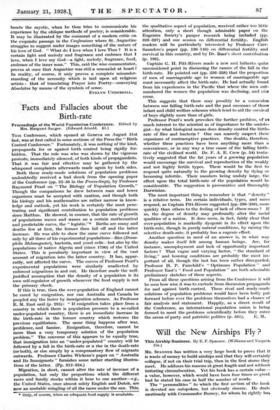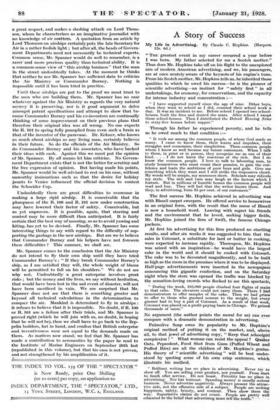Will the New Airships Fly ?
Mn. SPANNER has written a very large book to prove that it is waste of money to build airships and that they will certainly
collapse, if not on their trial trip, then in the first storm they meet. He adduces his reasons at great length and not without irritating circumlocution. Yet his book has a certain value- s value, however, which would have been four times as great had he stated his case in half the number of words.
The " personalities " to which the first section of the book
is devoted are outspoken, but obviously sincere. He deals cautiously with Commander Burney, for whom he rightly has a great respect, and makes a slashing attack on Lord Thom- son, whom he characterizes as an imaginative journalist with no knowledge of air matters. A quotation from an article by Lord Thomson on airships certainly puts the late Secretary for Air in a rather foolish light ; but after all, the heads of Govern- ment Departments need not necessarily be technical experts. Common sense, Mr. Spanner would do well to remember, is a rarer' and more precious quality than technical ability. It is a 'common-sense view of "this airship business" that the man in the street undoubtedly takes. At the moment he thinks that neither he nor Mr. Spanner has sufficient data to criticize the Air Ministry or Commander Burney. Nothing is impossible until it has been tried in practice.
Until these airships are put to the proof we must trust to (he men who are building them. Mr. Spanner has no case whatever against the Air Ministry as regards the very natural secrecy it is preserving, nor is it good argument to delve amongst patent specifications and attempt to show that be- cause Commander Burney and his co-inventors are continually thinking of some improvement on their previous plans that therefore their original idea was all wrong. No one expects the R. 101 to spring fully panoplied from even such a brain as that of the inventor of the paravane. Dr. Eekner, who knows as much about airships as any living man, certainly believes in their future. So do the officials of the Air Ministry. So do Commander Burney and his associates, who have backed their ideas with cash. Against this we must put the opinion of Mr. Spinner. By all means let him criticize. No Govern- ment Department exists that is not the better for scrutiny and the free expression of opinion. But having made his points, Mr. Spanner would be well advised to rest on his case, without unworthy insinuations such as that the desire for holiday jaunts to Venice influenced the official decision to contest the Schneider Cup.
Undoubtedly there are great difficulties to overcome in making a large rigid airship. It is conceivable that the plumpness of the R. 100 and R. 101 now under construction may have lowered their factor of safety. Conceivable, but as yet unproven. It is possible, again, that steering and control may be more difficult than anticipated. It is fairly certain that the best way of mooring, so as to avoid yawing and kiting, has yet to be devised. Finally, Mr. Spanner has some interesting things to say with regard to the difficulty of sup- porting the gasbags in the new airships. But are we to believe that Commander Burney and his helpers have not foreseen these difficulties ? This summer, we shall see.
Mr. Spanner comes to the conclusion that the Air Ministry do not intend to fly their own ship until they have tried Commander Burney's : "If they break Commander Burney's ship, as I am satisfied they will, the whole weight of blame will be permitted to fall on his shoulders." We do not see why not. Undoubtedly a great enterprise involves great risks ; but the money and the lives, we say without hesitation, that would have been lost in the sad event of disaster, will not have been sacrificed in vain. We are surprised that Mr. Spanner does not see that there is something greater and beyond all technical calculations in the determination to conquer the air. Mankind is determined to fly in airships : it refuses to believe that it is impossible. No doubt, if R. 100 or R. 101 are a failure after their trials, and Mr. Spanner is proved right (which he will join with us, no doubt, in hoping that he will not be), then we shall have to go back to the Zep- pelin builders, hat in hand, and confess that British enterprise and inventiveness were not equal to the demands made on them. As matters now stand; we feel that Mr. Spanner has made a contribution to aeronautics by the paper he read to the Institute of Marine Engineers on September 20th last (republished in this volume), but that his case is not proven, and not strengthened by his amplification -of it.







































 Previous page
Previous page